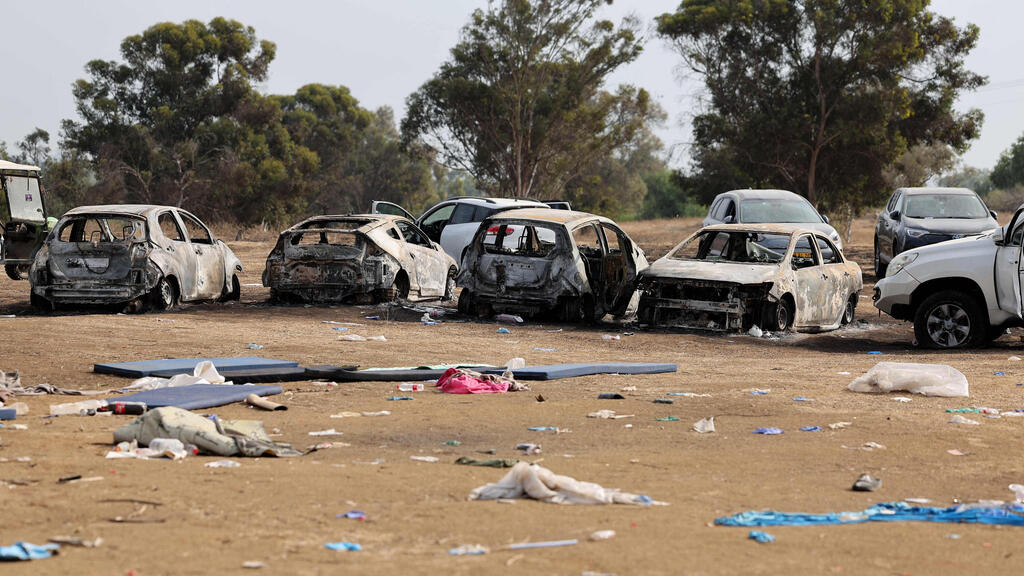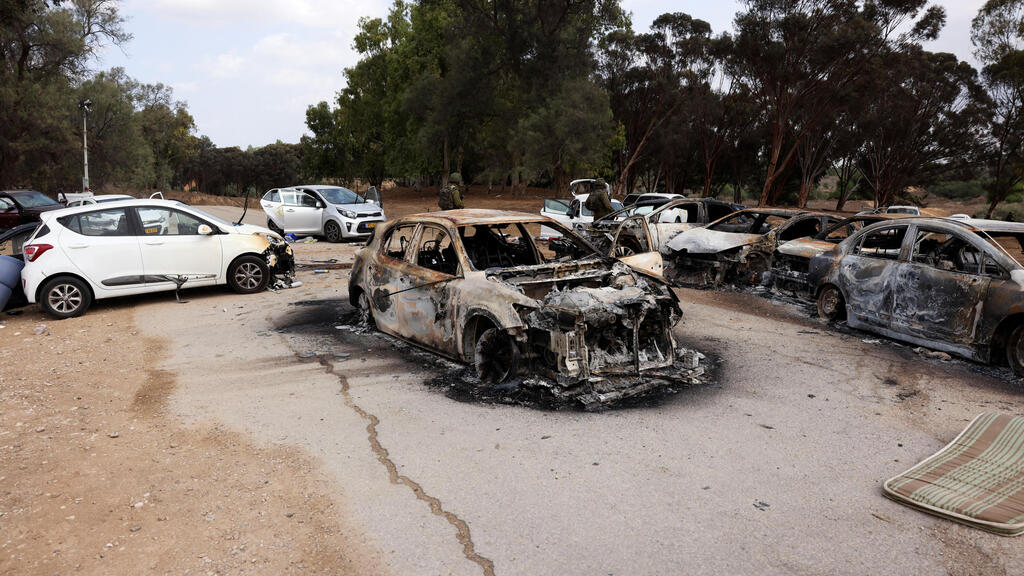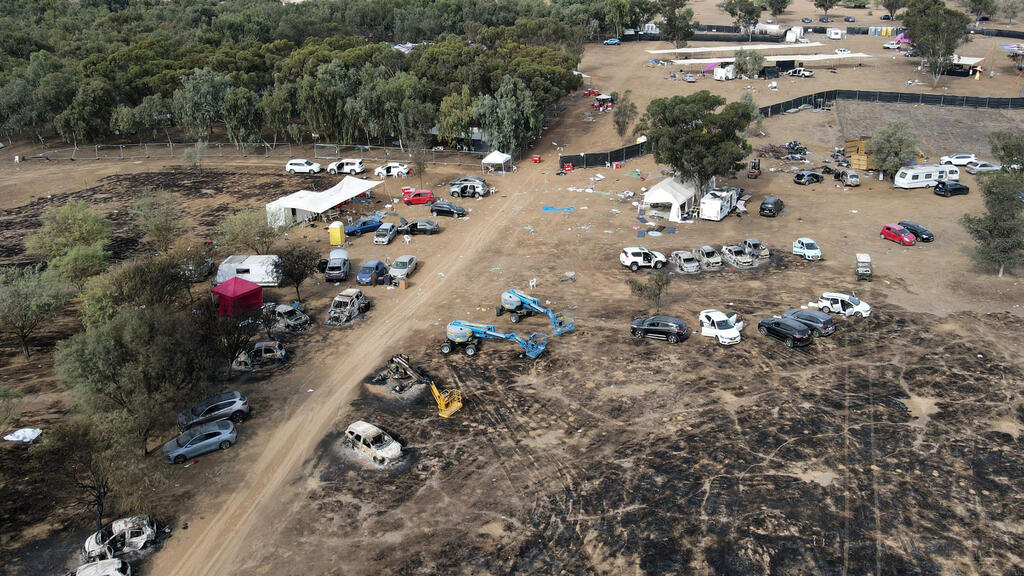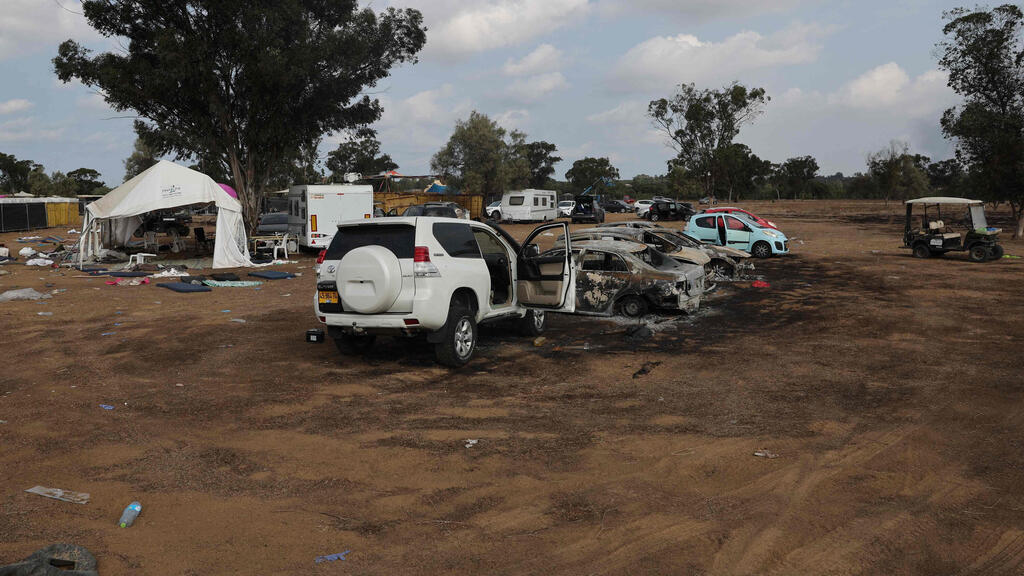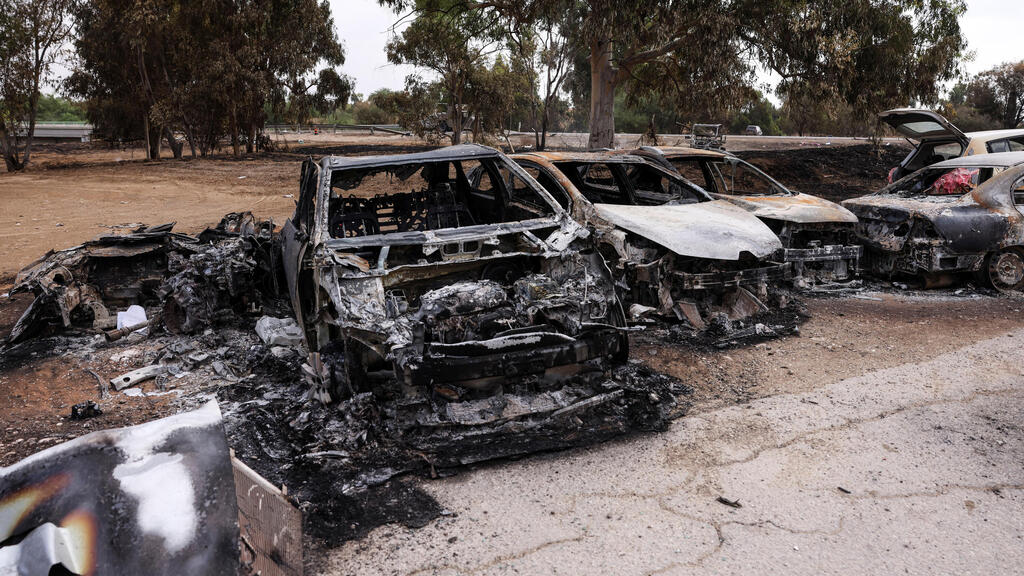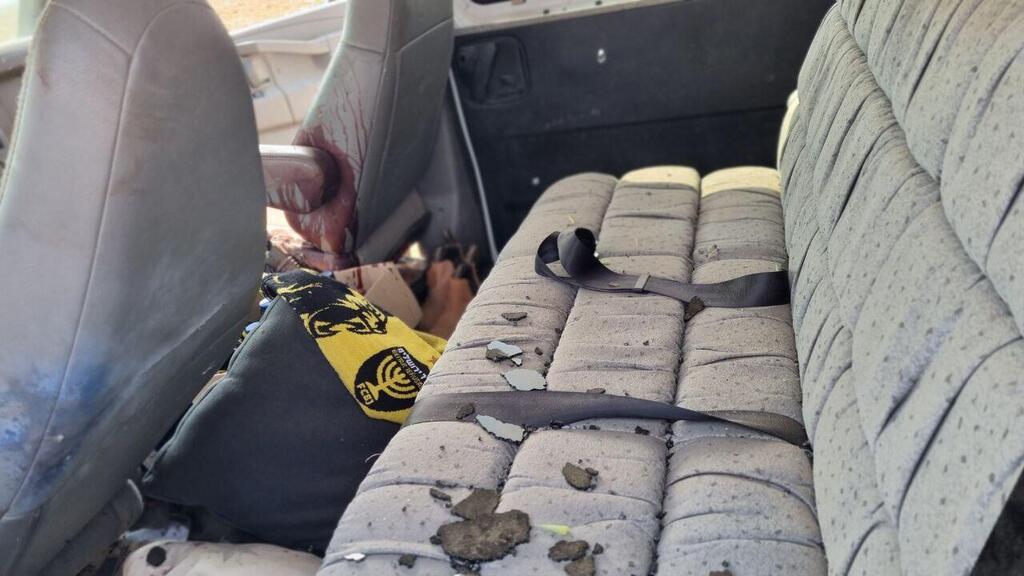Getting your Trinity Audio player ready...
Location of the festival, after the massacre
The harsh testimonies of those who attended the music festival near Kibbutz Re'im and survived the massacre carried out by Hamas terrorists continue to flow and demonstrate the magnitude of the horrific atrocity that took place there on Saturday.
Read more:
Mai Hayat, who worked at the bar at the festival along with her friend Liron, who was murdered there, was already held by Hamas terrorists who intended to kidnap her to the Gaza Strip, but she managed to escape at the last minute. Now she recounts the moments of horror.
"We were just walking towards our van to drink coffee when missiles started to get launched. The music stopped, and we waited for the missile attack to be over so we could drive home. A friend of mine called me up saying that they were being shot at and at everyone traveling on the road. Liron and I ran to the police officers hoping to ask for reinforcement for the people who were being shot at, but we realized that there were terrorists nearby. There was chaos."
"We hid in the police station, everyone sat on the floor, some cried, some shouted, some suffered an anxiety attack and some were completely silent. I hugged the one who cried and couldn't breathe, and Liron helped the wounded while we were under fire. The shootings started to get closer, the policemen stood ready with weapons by the door and looked at each other with frightened looks in their eyes and said: "charge". They turned to us and said, "Pray and run". They went outside - and fell one after the other. They shot in bursts at the container and for a moment there was quiet, we ran away to the field, I looked back and saw Liron, but she didn't join us.
"We fled for our lives, we reached an ambulance that was present in the area and we hid behind it, the shooting came from all directions. I saw someone down the road yelling 'Come over here, it's safer', I ran to him. We started running and saw a car approaching, it was a guy who attended the party; he said to us, 'Get on, we'll escape fast'. We got into his car; he drove to the road as the terrorists started shooting at us. He made a U-turn to the other side while they were shooting at us. He returned to the field and his car got stuck in the sand while they were shooting at us. We started running and the guy who drove the car disappeared. Only me and the other guy remained. We kept running and the guy saw a pit, we went inside, held hands, and prayed.
"I told him: 'Do you know the stories of the Holocaust where people played dead and thus nobody noticed them? That's what will happen to us here; he covered us with sand and we kept silent for about an hour until we started hearing footsteps approaching and we prayed. They found us. Eight of them. I closed my eyes because I thought they were going to shoot us, but they lifted us out of the pit, took our cell phones and whatever we had in our pockets, and said on the two-way radio: 'We have two more hostages.' One of the terrorists started talking to me in Arabic - and I told him I didn't understand what he was saying. I didn't shout, I didn't freak out, I became apathetic. He put his jacket on me - while everyone was looking at me as if I was a piece of meat because I was wearing a tank top - and put a hat on my head and took my hand. In one hand he was holding a rocket - and in the other hand, he was holding my hand.
We started walking; I saw that they were looking in the ground searching for things like cigarettes and beverages, so I helped them find some. I didn't try to resist. I was frozen. The guy who was with me begged for his life and cried, I told him: 'Don't cry, it annoys them, everything will be fine.' At first, he followed my instructions. Some of the terrorists had knives, some had hammers. He went down on his knees, and again screamed and cried and begged for his life - then he stopped screaming. They murdered him right before my eyes. I was left alone with the terrorists; one of them hit me on the head with a board every few seconds just to humiliate me, one of them held a knife and every few seconds approached me with it.
But the terrorist who was holding my hand shouted at them and protected me. We continued walking and reached a vehicle, I stood up and looked for the terrorist with the knife because I wanted to kill myself before they put me in the car; the car didn't start. We continued walking and the terrorist with the knife who had just murdered the guy who was with me said to me: 'If you try to escape, I will kill you like I killed your friend.' I remained still and the terrorist who protected me told me: 'Go'. I started running, I looked back and realized that they were not pointing a gun at me, and I ran like crazy.
I went under a platform and laid down next to three corpses; I took some of the blood that was dripping from the corpse next to me and applied it to my face, playing dead for three hours that felt like an eternity, three hours in which terrorists were shooting everywhere, burning everything around and missiles that were shot above me; three hours that I am among corpses trying to protect myself. Three hours in which I thought I was the only one left alive. Suddenly I heard Hebrew, I screamed: 'Help!', they were Israeli soldiers - and they took me to a caravan with paramedics and other survivors inside, but the shooting continued. Around me, there were injuries and sights that I cannot describe. They murdered my soul and I hope I will be able to heal it, but they also murdered my girlfriend, my Liron, my heroine, and no one can bring her back. "
"It felt like a scene taken from World War II"
Nitai, who also survived the massacre, recounts: "When the barrage started, I wasn't very anxious, I just laid on the floor. I was there with a friend who came to work at the festival, and I offered to help pack up his things. We heard gunshots, but we thought that Israeli soldiers must be dealing with terrorists at the border - and that would be the end of it. We did not grasp the scope of the event. Around 7 a.m. I told my friend that we must get the hell out of there. I called up my sister asking her to stay on the line and listen. I ran towards the policemen hoping they would bring us weapons. I got closer and saw the fighting. They shouted at us telling us to escape. I ran down a wadi and met a lot of people there. I warned them that the terrorists would slaughter us, and we must run. Some ran, and some didn't believe me. I went up to the road and saw a convoy of fleeing vehicles. I tried to open the car doors, but they were locked. I met two Argentinian tourists who were not hiding well, I implored them to come with me. We ran under gunfire coming from every direction - and arrived at another wadi with an olive grove. The tourists were fully focused, and we tried to create a 360-degree observation.'
"I heard from a distance someone shouting 'hurry up, they're here', there were lots of shooting, we ran like crazy. We went into the bushes. We were in an olive grove - and as a fighter in Golani (Israeli military infantry brigade), I know it's every fighter's nightmare. We were playing hide-and-seek with the terrorists while hearing shots from the outside. We got to some container and noticed a man lying inside who was shot by an RPG; he was mumbling. I cried and told him: 'I love you, bro, I hope you'll be okay'; we couldn't save him, we had to take care of ourselves. It was such a harsh dilemma, it goes against everything I've learned - not to leave the wounded behind, but I couldn't pick him up."
"Suddenly we heard shooting again and people shouting at us to run; we wanted to have a better visual angle, so I arranged the Argentinian tourists again in 360 degrees, aiming to convey calmness. I heard single gunshots, which meant that the IDF was in the area; I was able to distinguish between the enemy's automatic firing and our controlled shooting.
"We tried to look and see what was happening and we only heard gunshots with explosions and bombing. I sent my sisters a location, and one of my sisters passed it on. I decided that we had to go back to the container to help the guy, I saw that there were two other girls there who were at the party. One of them was an officer with the Israeli border police who was on vacation, she calmed us down. The wounded guy was made an artery occlusion, but he was also bleeding in the stomach. Helicopters passed over us and we tried to signal to them with our hands, I hoped that it would land there and rescue us."
"At this point in his testimony, Nitai broke down in tears: "I kept thinking about my friends; our families haven't heard a thing, they called me and I said 'I can't talk right now- they are shooting at us.'
"I heard a motorcycle entering the wadi, I was afraid to hear Arabic, I waited for the noise of the motorcycle to stop and then we heard them speaking Arabic. They were standing a few meters away from us, but we didn't see them, we only heard them until they got closer to us. They were in some kind of turmoil; they were looking for us and probably heard us - and approached in our direction. I tried to calm myself; suddenly we heard more talking from the other side. We decided we would attack them as soon as we could. When they approached us, there was shouting around us and we heard them moving away, we heard single gunshots, they apparently went in the direction of our forces.
"We saw a Bedouin Arab boy and I couldn't decide whether to reach him, or else the terrorists would notice me. I looked at the boy, I imagined that he was working in agriculture there, he seemed confused and scared. We could not risk ourselves by trying to reach him. When the terrorists got closer, the wounded guy stood up, as he must have realized that the terrorists were right there, so he started running holding his bleeding stomach. He turned back because he realized he had made a mistake. I heard the terrorists skipping over us, I prayed 'Shema Israel', turning to my father who died three years ago praying for him to watch over me from above.
Suddenly I didn't hear them anymore, they went back. These were minutes that felt like an eternity. We just didn't want to get caught by these bastards who murdered our friends, who came to the party.
As they walked away, I started breathing again; I don't know what was going on there - and why they walked away. I was feeling nervous, waiting for the time to pass. After an hour or so we heard someone shouting in our direction, I tried to understand what was being said, but something in the way they called us sounded human, it was clear that these were Israelis. I hugged one of the military officers, thanked him, and told him that I loved him. It felt like a scene taken from World War II when the Americans came, and the Jews jumped on them.
I asked them for a weapon, I've been working in security for a long time, and one of the officers brought me a weapon and asked the people who drove the vans to come in our direction. The officer from the Israeli border police also took a weapon, she was amazing, acting like Wonder Woman.
Police cars arrived to collect the wounded, and we got on the vans and escaped. We arrived at the police station and there I met one of the friends I had left at the party, he said that he had heard that some of our friends had arrived in Patish village. I believed that the safest place for us was at the police station in Ofakim.
We were without weapons, and everyone acted like heroes. We became shadow people, it was crazy. It was a massacre of 5,000 people, who were fighting the best way they could hung from trees. When we met at the police station, we strengthened each other. There are many stigmas and stereotypes about this kind of rave, but I must say that there was such fellowship, and caring like no one can imagine.
People who were there must talk and share what they've gone through in order to overcome the trauma. I will get over it, I am reinforced by people around me. I call on everyone who was there, all the fighters who came there - speak up. It's very important. "






